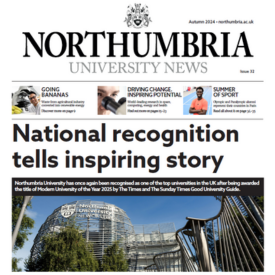-
Study
-
Undergraduate
- Search for a Course
- Undergraduate Open Day & Events
- Application Guides
- Northumbria University UCAS Exhibitions
- Foundation Years
- Undergraduate Fees & Funding
- School & College Outreach
- Continuing Professional Development
-
Postgraduate
- Postgraduate Study Degree
- Postgraduate Research Degrees
- Postgraduate Open Days and Events
- Postgraduate Fees & Funding
- Flexible Learning
- Thinking about a Masters?
- Continuing Professional Development
- Change Direction
-
Student Life
- The Hub - Student Blog
- Accommodation
- Life in Newcastle
- Support for Students
- Careers
- Information for Parents
- Students' Union
- Northumbria Sport
- Be Part of It
-
-
International
International
Northumbria’s global footprint touches every continent across the world, through our global partnerships across 17 institutions in 10 countries, to our 277,000 strong alumni community and 150 recruitment partners – we prepare our students for the challenges of tomorrow. Discover more about how to join Northumbria’s global family or our partnerships.
View our Global Footprint-
Applying to Northumbria
- European Union
- Our London Campus
- Northumbria Pathway
- International Events
- Entry Requirements and Country Representatives
- Regional Offices
-
Northumbria Language Centre
- Faculty Requirements
- Acceptable English Requirements
- Pre-sessional English Language and Study Skills
- Academic Language Skills Programmes (ALS)
-
International Fees, Funding & Scholarships
- International Undergraduate Fees
- International Undergraduate Funding
- International Masters Fees
- International Masters Funding
- International Postgraduate Research Fees
- International Postgraduate Research Funding
- International Money Matters
-
Life at Northumbria
- International student support
- Careers
-
International Mobility
- Current Northumbria Students
- Incoming Exchange Students
-
-
Business
Business
The world is changing faster than ever before. The future is there to be won by organisations who find ways to turn today's possibilities into tomorrows competitive edge. In a connected world, collaboration can be the key to success.
More on our Business Services -
Research
Research
Northumbria is a research-rich, business-focused, professional university with a global reputation for academic quality. We conduct ground-breaking research that is responsive to the science & technology, health & well being, economic and social and arts & cultural needs for the communities
Discover more about our Research -
About Us
-
About Northumbria
- Our Strategy
- Our Staff
- Place and Partnerships
- Student Profiles
- Alumni Profiles
- Leadership & Governance
- Academic Departments
- University Services
- History of Northumbria
- Contact us
- Online Shop
-
-
Alumni
Alumni
Northumbria University is renowned for the calibre of its business-ready graduates. Our alumni network has over 244,000 graduates based in 178 countries worldwide in a range of sectors, our alumni are making a real impact on the world.
Our Alumni - Work For Us
What will I learn on this module?
The Professional Practice 3 module introduces you to media marketing, distribution, exhibition and financing the development and production of films. The module includes a basic understanding of financial agreements and their importance in funding films.
The module introduces you to the notion and practices of media marketing through developing a marketing portfolio for an actual project you are associated with or a craft skill that you wish to promote (for example; yourself as a cinematographer, screenwriter, producer etc).
It will show you the various approaches and contexts of distribution with regard to both traditional forms and the potential for new exhibition platforms. The module also introduces you to various forms of film finance available both in the UK and the rest of the world, covering such aspects as related legal issues with the development and production of film.
How will I learn on this module?
As a Level 6 student you will further develop skills in fluent communication and be expected to organise your own time. The module will be delivered through a combination of lectures and seminars delivering the considerations of film finance, media marketing, distribution and exhibition and the relevant aspects of media law. The lectures will enable the tutor to discuss the key dynamics of film finance and media marketing practice in an in-depth manner. The seminars will be structured to reflect the core issues and themes of the module. The tutor will frame the content of each seminar and outline the aim and outcomes. All lecture materials, seminar guidelines and module information will be placed on the eLearning Portal. Outside of the taught sessions, you will be expected to engage with module-relevant reading in preparation for the sessions. An electronic reading list is supplied via the e-Learning Portal, which will guide you towards appropriate resources, although you are encouraged to explore the wider library catalogue to engage with additional sources too. During your independent working time, it is also expected that you will apply the ideas raised in the reading and the taught content to film examples of your own choosing (reflecting your individual interests), and to your own practice.
How will I be supported academically on this module?
This module provides three forms of support – both from the tutor, from your fellow students and from online resources such as the eLearning Portal. The tutor provides extensive support through formative feedback, especially in seminars. The tutor is also available during published Tutorial and Feedback hours on a weekly timetable to take individual queries on a drop-in basis. Tutors will also respond to emails, from you, to help with any questions or issues. You will be supported by the module lead; they will introduce the module at the start of the semester and offer advice and guidance throughout. Your learning is mapped out via documentation on Blackboard Ultra, the Northumbria University online electronic learning portal; this is accessible online on and off campus. The e-Learning Portal will include guidance notes and key dates to help you organise and plan your time. It will also include teaching materials, announcements and updates, and detailed information on assessment. Summative assignments will receive written feedback within 20 working days of assignment submission. Every tutor has set weekly feedback and tutorial drop in hours, wherein you can seek advice on your academic progress. Where appropriate you may also be directed to engage with our Skills Plus or other resources offered through the University Student Support Services such as Dyslexia Support. Guidance tutorials also provide opportunities for students to discuss, in confidence, their academic progress on the programme.
What will I be expected to read on this module?
All modules at Northumbria include a range of reading materials that students are expected to engage with. Online reading lists (provided after enrolment) give you access to your reading material for your modules. The Library works in partnership with your module tutors to ensure you have access to the material that you need.
What will I be expected to achieve?
Knowledge & Understanding:
1. Understand the key aspects to market your film and/or yourself through a press pack and website.
2. Demonstrate an understanding of the role of film festivals and film organisations in developing a career.
Intellectual / Professional skills & abilities:
3. Evidence creativity and imagination in the deployment of your marketing material, with appropriate use and understanding of websites.
Personal Values Attributes (Global / Cultural awareness, Ethics, Curiosity) (PVA):
4. Show awareness of the cultural differences between traditional and new finance, online screening and film festivals.
How will I be assessed?
Formative assessment is by verbal feedback on draft submission of portfolios and the case studies.
Summative assessments will test skills of organisation, communication, research, critical engagement, and practice and will be focused on the analysis of key issues arising from the syllabus. You will be assessed by producing an individual marketing portfolio that will be equivalent to 2,000 words, containing a press book, a website, an invite to a screening, a gift, website screenshots, evidence of joining a film organisation for newsletters and Twitter accounts. An evaluation of 1,000 words will be included as part of your submission. This will discuss a festival strategy and a funding strategy in a critical and analytical way, with references and a bibliography. The marketing portfolio is targeted towards the promotion of your own final year work (film production or screenplay) or yourself as a filmmaker or craftsperson (e.g. cinematographer, sound designer etc).
The portfolio will address all of the MLOs.
Pre-requisite(s)
none
Co-requisite(s)
none
Module abstract
The Professional Practice 3 module introduces you to media marketing, distribution, exhibition and financing the development and production of films. The module includes a basic understanding of financial agreements and their importance in the funding of films.
The module introduces you to the notion and practices of media marketing by creating a marketing portfolio for an actual project or projects that you are associated with or yourself as a craftsperson. It will show you the various approaches and contexts of distribution with regard to both traditional forms and the potential for online exhibition.
The module also introduces you to various forms of film finance available both in the UK and the rest of the world. It also delivers an overview of the legal issues with the development and production of film.
Course info
UCAS Code P310
Credits 20
Level of Study Undergraduate
Mode of Study 3 years Full Time or 4 years with a placement (sandwich)/study abroad
Department Arts
Location City Campus, Northumbria University
City Newcastle
All information is accurate at the time of sharing.
Full time Courses are primarily delivered via on-campus face to face learning but could include elements of online learning. Most courses run as planned and as promoted on our website and via our marketing materials, but if there are any substantial changes (as determined by the Competition and Markets Authority) to a course or there is the potential that course may be withdrawn, we will notify all affected applicants as soon as possible with advice and guidance regarding their options. It is also important to be aware that optional modules listed on course pages may be subject to change depending on uptake numbers each year.
Contact time is subject to increase or decrease in line with possible restrictions imposed by the government or the University in the interest of maintaining the health and safety and wellbeing of students, staff, and visitors if this is deemed necessary in future.
Useful Links
Find out about our distinctive approach at
www.northumbria.ac.uk/exp
Admissions Terms and Conditions
northumbria.ac.uk/terms
Fees and Funding
northumbria.ac.uk/fees
Admissions Policy
northumbria.ac.uk/adpolicy
Admissions Complaints Policy
northumbria.ac.uk/complaints














